
When I first started working with adults on the autism spectrum, I noticed something that kept coming up in our conversations. People would describe feeling scattered, overwhelmed by simple tasks, or frustrated when their carefully laid plans fell apart.
What they were describing wasn’t just stress. It was the daily reality of living with executive function challenges in adults with Autism. Executive functioning encompasses the mental skills that include working memory, flexible thinking, and self-control. We use these skills every day to learn, work, and manage daily life.
For adults seeking comprehensive autism assessment or those who’ve recently completed their adult autism evaluation, understanding these executive function challenges becomes a crucial piece of developing effective coping strategies for high-functioning autism and building a more manageable daily routine.
Why Executive Function Issues Often Go Unnoticed
Executive function difficulties in adults with autism are often invisible to the outside world. Someone might appear perfectly capable of handling complex tasks at work, yet struggle to remember to pay bills or feel completely overwhelmed when their usual coffee shop changes its layout.
These aren’t character flaws or laziness. There are neurological differences that affect how the brain processes and organizes information. The impact ripples through every aspect of life: missing important deadlines, difficulty maintaining friendships, struggling with financial planning, or feeling constantly behind despite working harder than everyone else.
Many adults discover these patterns during their adult autism assessment process, which helps identify specific areas where individualized autism treatment plans can provide targeted support. Recognizing these challenges isn’t about limitations. It’s about understanding how your brain works so you can access the right autism support services for adults.
Looking for clarity about Autism in adulthood?
An assessment can help you better understand yourself and open the door to support. Let’s take the first step together.
Available online to adults anywhere in California.
Real-World Strategies That Actually Work
The good news? There are practical ways to work with your brain instead of against it. I’ve seen people transform their daily lives by finding the right combination of tools and strategies.
Some swear by color-coded calendars that turn abstract time into something visual and concrete. Others rely on smartphone apps that break overwhelming projects into bite-sized steps. The key is finding what clicks for you personally.
Environmental changes can be game-changers, too. Having a designated spot for keys, reducing visual clutter in workspaces, or creating consistent morning routines that run on autopilot. These skill-building therapies for high-functioning individuals often combine both high-tech solutions (like project management apps) and surprisingly simple low-tech approaches (like sticky note systems).
Managing high-functioning autism as an adult isn’t about forcing yourself into neurotypical molds. It’s about discovering the systems and environments where you naturally thrive.
Professional Help For Executive Function Challenges in Adults with Autism
Sometimes self-help strategies aren’t enough, and that’s completely normal. Professional support can provide the structured approach needed to tackle executive function challenges systematically.
Cognitive Behavioral Therapy (CBT) is particularly helpful because it addresses the anxiety and overwhelm that often accompany executive function difficulties, making it one of the most effective therapy approaches for autistic adults. The beauty of CBT is that it gives you concrete tools to manage the emotional side of executive function challenges: the frustration, the self-criticism, the feeling of being constantly behind.
Occupational therapy for adults with autism takes a different but equally valuable approach, focusing on the practical nuts and bolts of daily life. Adult autism therapy plans work best when they’re tailored to your specific situation and goals.
The best therapy for adults with autism often includes result-driven therapy for adult autism that tracks real improvements in day-to-day functioning. Comprehensive autism therapy services might also incorporate mindfulness techniques, stress management, and social skills development because executive function challenges rarely exist in isolation.
Ready for support that truly fits you?
One-on-one therapy can provide tools, self-understanding, and strategies to move through life with more confidence.
Sessions available online throughout California.
Building Your Support Network
One of the most important things I’ve learned is that executive function challenges affect relationships, but they don’t have to damage them. When family members, friends, and coworkers understand what’s really going on, they can become powerful allies instead of sources of frustration.
At work, simple accommodations like written instructions instead of verbal ones, flexible deadlines, or a quiet workspace can make an enormous difference. For neurodiverse couples, understanding executive function differences is essential, and couples therapy for neurodiverse individuals can help partners develop communication strategies that work for both neurotypes.
Many adults find tremendous value in connecting with online autism support groups, where they can share practical tips and realize they’re not alone in their struggles. The goal of autism support for adults should be creating environments where different ways of thinking and organizing are accommodated rather than penalized.
It’s about building a world where executive function differences are seen as variations, not deficits.
Your Path Forward
Executive function challenges don’t have to define your limits. They can actually become a roadmap for understanding how you work best.
Whether you’re just beginning to explore the possibility of autism through your first adult autism assessment or you’re looking for ongoing autism counseling for adults, remember that progress isn’t always linear. Some days will be harder than others, and that’s okay.
The goal isn’t to become neurotypical. It’s to build a life that works for your unique brain. With access to comprehensive therapy services for adult autism, supportive relationships, and the right combination of strategies and tools, you can develop the executive function skills that matter most to you.
Success looks different for everyone. Maybe it’s finally keeping track of important documents, managing work deadlines without constant stress, or simply feeling more in control of your daily life. Whatever your goals, they’re worth pursuing.
